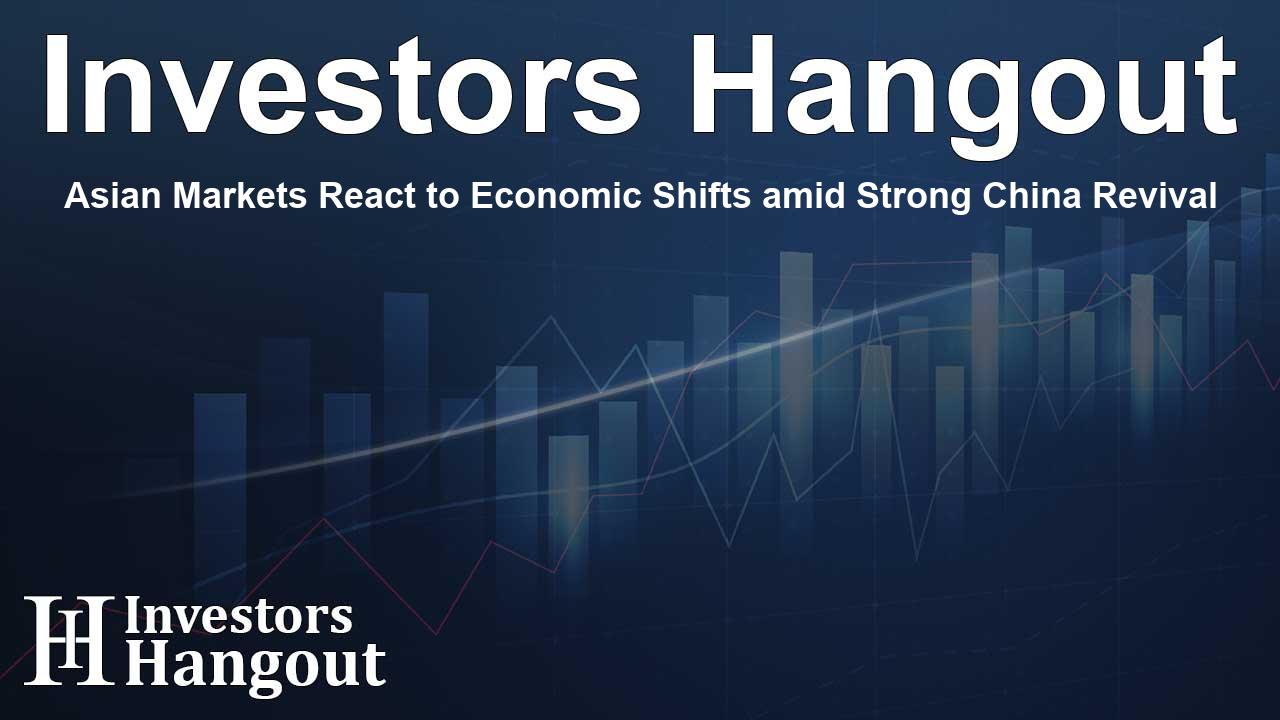Asian Markets React to Economic Shifts amid Strong China Revival

Asian Stock Markets Experience Decline
In recent trading sessions, most Asian stock markets witnessed a decline. This downturn comes as a reaction to a drop on Wall Street, where signs of a robust U.S. job market raised concerns over sustained high interest rates. Concerns about the future direction of rates have led investors to reassess their strategies.
Despite the overall decline, Chinese markets saw a significant upswing, driven by the return from a week-long holiday and a series of stimulus measures from Beijing designed to invigorate economic growth.
While broader Asian markets struggled, technology stocks particularly took a hit. Investors remained cautious amid regulatory uncertainties and downgrades from analysts regarding major tech firms.
China's Market Gains Fueled by Stimulus Initiatives
Chinese stock indices, such as the Shanghai Composite and the CSI 300, surged significantly after reopening. The initial trading sessions showcased impressive gains, reaching increases of up to 8% as traders reacted positively to government-backed stimulus efforts aimed at jumpstarting economic activities.
The excitement stemmed from pent-up demand and optimistic expectations following a week of stimulus announcements that included interest rate cuts and relaxed banking requirements. With these moves, officials are fostering an environment that aims to uplift economic productivity.
These stimulating actions also included measures aimed at revitalizing the property market and providing liquidity to financial markets. The response from investors reflected a sense of renewed optimism following a decline in benchmarks to a seven-month low prior to the holiday.
Broader Asian Markets Face Challenges
Outside of China, other Asian markets experienced varying levels of losses influenced by a lackluster performance on Wall Street. Notably, the sharper decline in U.S. stocks raised concerns among Asian investors, who anticipated similar vulnerabilities in their markets.
In markets like Hong Kong, the Hang Seng index faced a drop of nearly 4%, counteracting earlier optimism related to stimulus measures from China.
Other regions such as Japan also felt the impact, with both the Nikkei 225 and TOPIX indices experiencing modest declines. Recent data indicated mixed signals, contributing to the subdued market sentiment. While wage growth showed signs of slowing, consumer spending remained resilient, supporting expectations of persistent inflation.
Technology Sector Struggles amid Global Trends
The technology sector, a significant player in many Asian economies, appeared most adversely affected. Major companies, including tech giants like Alphabet (NASDAQ: GOOGL), Apple (NASDAQ: AAPL), and Amazon (NASDAQ: AMZN), faced notable declines, prompting caution among investors.
In South Korea, the KOSPI index fell, primarily due to slipping shares of Samsung Electronics (KS: 005930), as the company hinted at disappointing profit forecasts. Additionally, rival company SK Hynix (KS: 000660) also faced a downturn, reflecting broader concerns within the semiconductor industry.
In contrast, Australia’s ASX 200 index saw limited losses, due in part to the country’s strong trade ties with China. Positive consumer sentiment figures offered a buffer against the wider market outlook, signaling potential resilience in the Australian economy.
Focus on Future Market Developments
As Asian markets navigate this complex landscape, investors remain vigilant. Expectations are set on upcoming financial reports and government announcements related to further stimulus measures. With uncertainties still prominent, it will be interesting to see how market dynamics unfold, particularly in light of ongoing economic shifts and regulatory frameworks.
Frequently Asked Questions
What caused the decline in Asian stock markets?
The decline was largely influenced by weakness on Wall Street due to concerns over maintaining high interest rates in light of a resilient U.S. job market.
Which regions showed growth despite the overall market decline?
Chinese markets saw significant growth driven by stimulus measures from the government aimed at stabilizing and boosting economic growth.
How did technology stocks perform recently?
Technology stocks faced substantial losses, primarily due to negative market sentiment after declines in major U.S. tech firms.
What economic indicators are affecting market confidence?
Indicators such as wage growth and consumer spending in Japan have been mixed, contributing to uncertainty among investors.
What measures is China implementing to support its economy?
China has introduced multiple stimulus measures including interest rate cuts, easing of property market restrictions, and liquidity support for financial markets.
About Investors Hangout
Investors Hangout is a leading online stock forum for financial discussion and learning, offering a wide range of free tools and resources. It draws in traders of all levels, who exchange market knowledge, investigate trading tactics, and keep an eye on industry developments in real time. Featuring financial articles, stock message boards, quotes, charts, company profiles, and live news updates. Through cooperative learning and a wealth of informational resources, it helps users from novices creating their first portfolios to experts honing their techniques. Join Investors Hangout today: https://investorshangout.com/
Disclaimer: The content of this article is solely for general informational purposes only; it does not represent legal, financial, or investment advice. Investors Hangout does not offer financial advice; the author is not a licensed financial advisor. Consult a qualified advisor before making any financial or investment decisions based on this article. The author's interpretation of publicly available data shapes the opinions presented here; as a result, they should not be taken as advice to purchase, sell, or hold any securities mentioned or any other investments. The author does not guarantee the accuracy, completeness, or timeliness of any material, providing it "as is." Information and market conditions may change; past performance is not indicative of future outcomes. If any of the material offered here is inaccurate, please contact us for corrections.